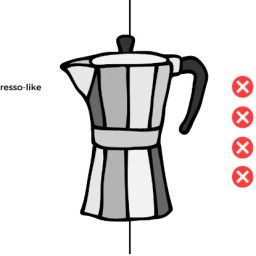
Understanding the carbohydrate content in coffee with milk is crucial for those who monitor their carb intake, whether for dietary reasons, diabetes management, or following a specific nutrition plan. Coffee by itself is a low-calorie beverage, nearly carb-free, but the addition of milk changes that. Since milk contains lactose, a type of sugar, knowing how much and what kind of milk you add can significantly affect your carb intake.
Carbs in Different Types of Coffee with Milk
The carbs present in coffee with milk can vary widely based on the type of milk and the quantity added. Here’s a simplified breakdown to guide you:
- Whole Milk: Rich and creamy, whole milk adds about 12 grams of carbs per cup due to its natural sugar content. A dash in your coffee might only add a small amount, but it’s good to be aware of the cumulative effect over several cups.
- Skim Milk: Often chosen for being lower in fat, skim milk still contains about 12 grams of carbs per cup, almost entirely from sugars, which means carb-wise, it’s similar to whole milk.
- Plant-Based Milks: These can vary significantly in carb content:
- Almond Milk: Typically, unsweetened almond milk is a low-carb option, offering less than 1 gram of carbs per cup. However, sweetened versions can have more, so it’s essential to check the label.
- Soy Milk: A common dairy alternative, unsweetened soy milk contains about 4 grams of carbs per cup, making it a moderate-carb choice.
- Coconut Milk: Another lower-carb option, unsweetened coconut milk usually has about 2 grams of carbs per cup.
Key Takeaways
- Milk Types Matter: The type of milk you add to your coffee significantly impacts the total carbs. Whole and skim milk have about the same carb content, around 12 grams per cup, mainly from natural sugars.
- Plant-Based Variations: Almond milk is typically the lowest in carbs, often less than 1 gram per cup if unsweetened. Soy and coconut milks are moderate alternatives, with around 4 and 2 grams of carbs per cup, respectively.
- Sweeteners Add Up: Adding sugar or flavored syrups to your coffee can quickly escalate the carb count, with each teaspoon of sugar adding about 4 grams of carbs.
- Cream Counts: Regular dairy cream has about 1 gram of carbs per tablespoon, which can add up if you enjoy a richer cup of coffee.
- Monitor Your Mix-ins: Being aware of how much milk, cream, or sweetener you’re adding can help manage your carb intake effectively.
Additives and Their Impacts
When it comes to enjoying a cup of coffee, many of us like to add a little extra flavor with sugar, cream, or flavored syrups, not realizing how quickly the carbs can add up. Here’s what you need to know about these popular coffee additives:
Sugar: It’s no surprise that sugar is a major contributor to increasing carbohydrate levels in coffee. Just one teaspoon of sugar adds roughly 4 grams of carbs. If you tend to have multiple cups a day, this can quickly accumulate, impacting your overall carb intake significantly.
Cream: While cream makes your coffee taste richer and smoother, it also adds carbs. One tablespoon of heavy cream contains about 1 gram of carbs. Lighter creams and half-and-half offer similar carb content, so it’s wise to use them sparingly if you’re watching your carb count.
Flavored Syrups: These are a major source of carbs in specialty coffee drinks. A single pump of flavored syrup can contain as many as 5 to 10 grams of carbs, depending on the brand and flavor. If you enjoy these sweet additions, consider looking for sugar-free alternatives which offer the flavor without the carbs.
Artificial Sweeteners: For those looking to reduce sugar intake, artificial sweeteners can be an effective alternative. However, it’s important to choose wisely as some sugar substitutes can still contribute minimal carbs and may have other dietary implications.
Low-Carb Alternatives
For those looking to enjoy their daily coffee without the extra carbs, there are several low-carb alternatives that can help maintain a healthier intake:
- Unsweetened Almond Milk: A popular choice for coffee lovers, unsweetened almond milk adds a subtle nutty flavor with less than 1 gram of carbs per cup.
- Coconut Milk: For a hint of tropical flavor, unsweetened coconut milk can be a great addition, offering around 2 grams of carbs per cup. It’s creamy and works well in both hot and cold coffee.
- Heavy Cream: Although higher in fat, heavy cream has almost negligible carbs, making it ideal for those following ketogenic diets. Just a splash can enrich your coffee without adding significant carbs.
- Unsweetened Soy Milk: With approximately 4 grams of carbs per cup, soy milk is another viable option that offers a creamy texture similar to that of regular milk.
- Sugar-Free Syrups: Many brands offer sugar-free syrups flavored with sucralose or stevia, which can mimic the sweetness you crave without the carbs.
- Stevia: A natural sweetener with zero calories and carbs, stevia can sweeten your coffee without the blood sugar spike.
- Erythritol: Another sugar alcohol that’s keto-friendly and has a very minimal impact on blood sugar, making it suitable for adding sweetness without carbs.
Type of Coffee Beans and Brewing Methods
The type of coffee beans and the method used to brew your coffee can influence not just the flavor but also the carb content, albeit minimally:
Arabica vs. Robusta: Arabica beans are generally preferred for their smoother, more complex flavor profiles and lower acidity compared to the stronger, more robust Robusta beans. While the carb content in both is negligible, it’s the flavor profile and caffeine content that might sway your choice.
Espresso: Made by forcing hot water through finely-ground coffee beans, espresso is concentrated and has marginally higher carb content due to the greater extraction of soluble fibers. However, since servings are small, the actual carb impact is minimal.
Drip or Filter Coffee: This method involves hot water filtering through coffee grounds, typically resulting in a cleaner, crisper cup. The carb content remains very low as most of the soluble fibers are retained in the filter.
French Press: Without the use of a filter, the French press allows more of the coffee’s natural oils and fine particles into the cup, potentially adding a trivial amount of carbs. This method extracts a fuller flavor, which might appeal to those who enjoy a richer brew.
FAQs
How does the type of milk affect the carb content in coffee? Different types of milk can vary significantly in carb content. Whole and skim milk contain about 12 grams of carbs per cup, primarily from lactose, the natural sugar in milk. Plant-based milks like almond or coconut milk typically offer lower carb counts, with unsweetened versions ranging from less than 1 to around 2 grams per cup.
Do brewing methods change the carb content in coffee? The brewing method itself has a minimal effect on carb content. Traditional brewing methods such as drip or French press have negligible carbs. However, the use of espresso in drinks often means higher carb contents due to the concentrated nature of the brew and what is typically added to it (like syrups or more milk).
What are some tips for reducing carb intake from coffee? To reduce carb intake, consider using unsweetened plant-based milks, opt for sugar-free syrups, and monitor the amount of milk or creamer added. Another tip is to gradually reduce the sweetness over time, allowing your taste buds to adjust to less sweet coffee, thus cutting down on added sugars and carbs.
Final Thoughts
Opt for unsweetened plant-based milks like almond or coconut milk, which are lower in carbs compared to traditional cow’s milk. Keep an eye on the amount and type of sweeteners and creamers you use. Consider switching to low-carb or sugar-free alternatives. While the brewing method doesn’t significantly affect carbs, the type of coffee and the size of the serving can impact your overall carb intake, especially when you add extras like syrups or milk.









